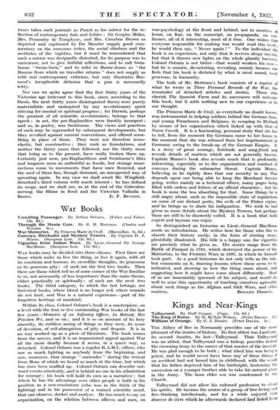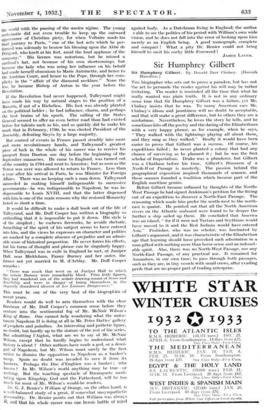Kings and Near-Kings
Talleyrand. By Duff Cooper. (Cape. 12s. 6d. ) THE Abbey of Bee in Normandy provides one of the more pleasant of the ironies of history. Its first abbot was Lanfranc, its second Anselm, its last—Talleyrand. That Talleyrand was an abbot, that Talleyrand was a bishop, provides indeed the crowning irony to the career of that master of the ironical. He was glad enough to be both ; what irked him was being a priest, and he would never have been any of these things if an accident had not lamed him in childhood, with the result that his father deprived him of his birthright, bestowing the succession on a younger brother able to take his natural place in the Army. The lame elder son was condemned to the Church.
Talleyrand did not allow his enforced profession to cloud his spirits. He became the centre of a group of free-living and free-thinking intellectuals, and for a while enjoyed that douceur de vivre which he afterwards declared had faded frail the world with the passing of the ander; riginte. The young- ecclesiastic did not even trouble to keep up the outward appearance of Christian piety, for when Voltaire made his
final journey to Paris, "one of the last acts which he per- formed was solemnly to bestow his blessing upon the Abbe de pezigord, who knelt at his feet, amid the loud applause of the company." His licence was notorious, but he missed a cardinal's hat, not because of his own shortcomings, but because the lady who was using her influence on his, behalf had made herself obnoxious to Marie Antoinette, and hence to the Austrian Court, and hence to the Pope, through her com- plicity in the "affair of the diamond necklace." None the less, he became Bishop of Autun in the year before the Revolution.
If the Revolution had never happened, Talleyrand might have made his way by natural stages to the position of a Mazarin, if not of a Richelieu. His foot was already planted on the political ladder ; he had influence, charm, and perhaps
the best brains of his epoch. The calling of the States. General seemed to offer an even better road than had existed
before for talents such as his, and so quickly did he make his mark that in February, 1790, he was elected President of the Assembly, defeating SieYes by a large majority.
But control of events in France passed steadily into more and more revolutionary hands, and 'Talleyrand's greatest piece of luck in the whole of his career was to receive his passport from Danton one day before the beginning of the September massacres. He eame to England, was turned out of the country in 1794 and went to America; but as soon as the Terror was over was allowed to return to France. Less than a year after his arrival in Paris, he was Minister for Foreign Affairs. There was no keeping such a man down. Talleyrand succeeded in making himself indispensable to successive governments—he was indispensable to Napoleon, he was in- dispensable to Louis XVIII, and that the latter dispensed with him is one of the main reasons why the restored Monarchy lasted so short a time. - It would be difficult to make a dull book out of the life of Talleyrand, and Mr. Duff Cooper has written a biography so enthralling that it is impossible to put it down. His style is of the simplest ; he eschews fireworks, he avoids rhetoric. Something of the spirit of his subject seems to have entered into him, and the views he expresses on character and politics are marked by a complete absence of prejudice and an admir- able sense of historical proportion. He never forces his effects, but his turns of thought and phrase can be singularly happy.
When Talleyrand was in exile in England he met, at Juniper Hall, near Mickleham, Fanny Burney and her sister, the former not yet married to M. d'Arblay. Mr. Duff Cooper remarks :
"There was much that went on at Juniper Hall to which the sisters Burney were remarkably blind. Prim little figures, they had wandered out of the sedate drawing-rooms of Sense and Sensibility and were in danger of losing themselves in the elegantly disordered alcoves of Les Liaisons Dangereusee."
This must be one of the very best of the biographies of recent years.
Readers would do well to arm themselves with the clear flambeau of Mr. Duff Cooper's common sense before they
venture into the sentimental fog of Mr. McNair Wilson's King of Rome. One cannot help wondering what the unfor- tunate Napoleon II is doing at all in Mr. Peter Daties' gallery
of prophets and paladins. An interesting and pathetic figure, no doubt, but hardly up to the stature of the rest of the series.
But admitting l'Aiglon, what are we to say of Mr. McNair Wilson, except that he hardly begins to understand what history is about ? Other authors have made a god, or a demi- god of Napoleon, but Mr. Wilson must surely be the first writer to dismiss the opposition to Napoleon as a banker's
ramp. Spain no doubt was invaded to save it from its bankers. Perhaps the Due d'Enghien was a banker ; who knows ? In Mr. Wilson's world anything may be true—or nothing. But the touching spectacle of Buonaparte medi-
tating upon Kingship, God and the Fatherland, will be too much for most of Mr. Wilson's would-be readers.
Dr. G. J. Renier's William of Orange, on the other hand, is a well-balanced study of a great, if somewhat unsympathetic Personality. Dr. Healer points out that William was always and that his whole career was one heroic battle of mind against body. As a Dutchman living in England; the author s able to see the politics of his period with William's own wide vision, and he does not fall into the error of looking upon him merely as an English being. A good monograph, complete and compact ! What a pity Dr. Renier could not bring himself to omit his cocky little Foreword !
JAMES LAVER.











































 Previous page
Previous page